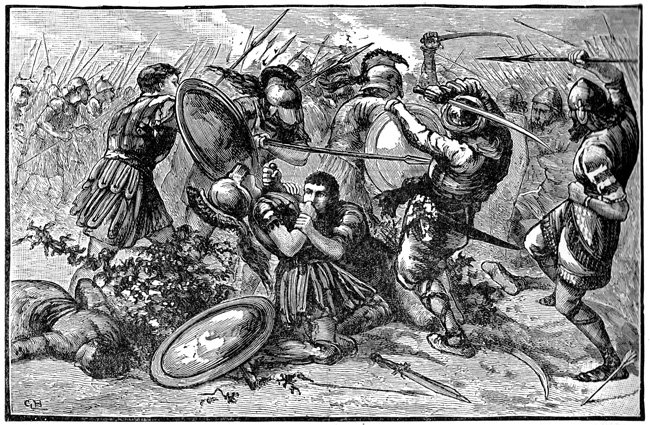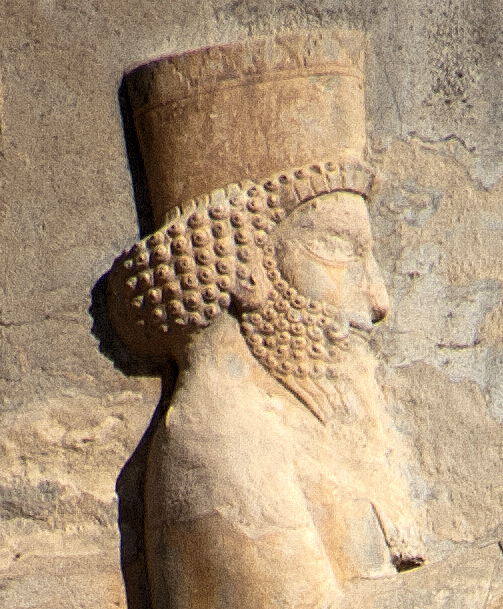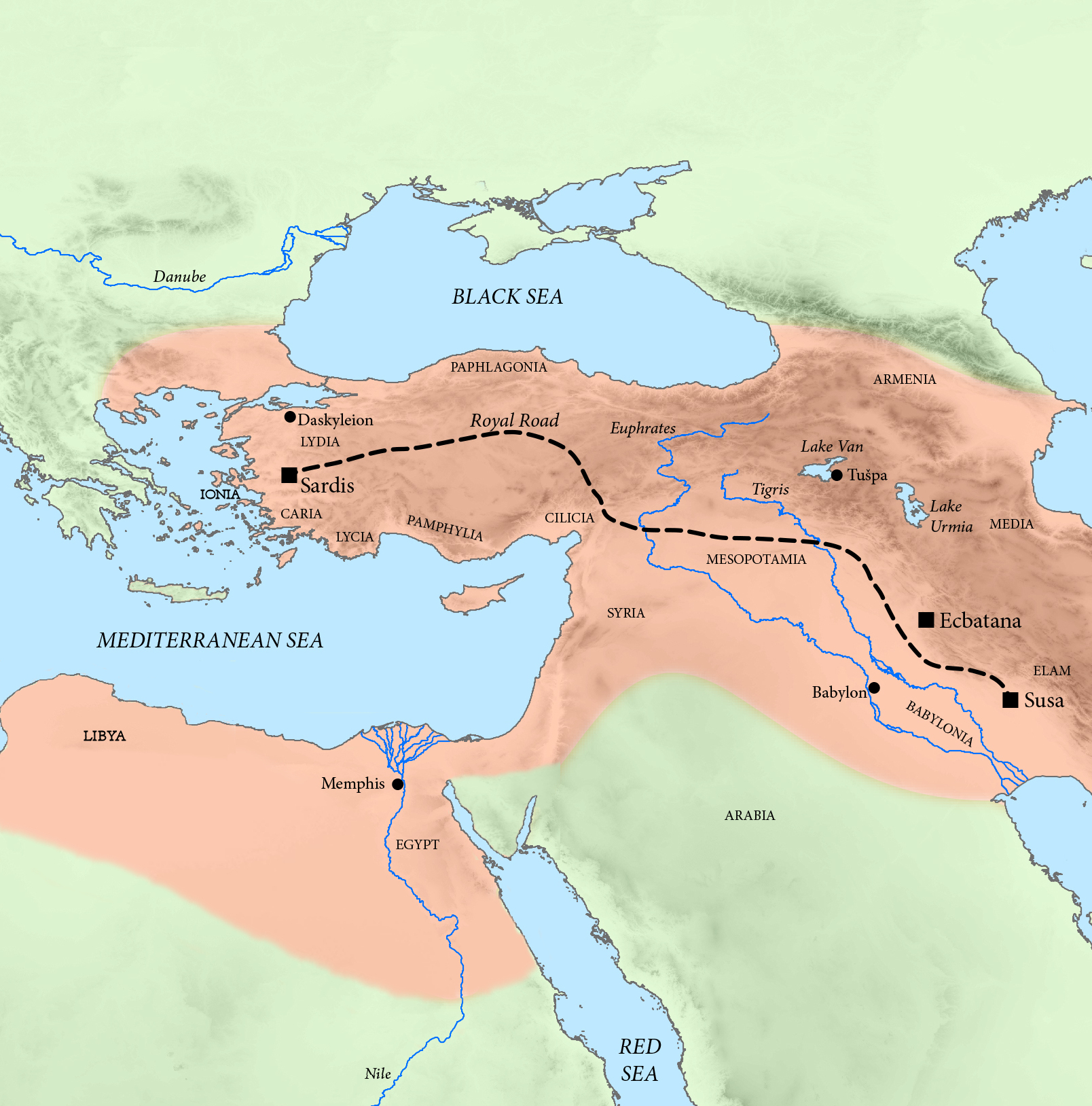|
Meno (general)
Meno ( /ˈmiːnoʊ/; Greek: Mένων, ''Menōn''; c. 423 – c. 400 BC), son of Alexidemus, was an ancient Thessalian political figure. Probably from Pharsalus, he is famous both for the eponymous dialogue written by Plato and his role as one of the generals leading different contingents of Greek mercenaries in Xenophon's ''Anabasis.'' In various first hand accounts, including ''Anabasis,'' his name appears as Menon. Meno's Beginning and Command Meno is reported, by both Xenophon and Plato, to have been attractive and in the bloom of youth, not yet even having a beard, and was quite young at his death. He had many lovers, including Aristippus of Larissa, Tharypas, and Ariaeus the Persian. Xenophon gives a strongly hostile description of Meno as a disreputable, ambitious and dishonest youth, willing to commit any injustice for advancement, and immeasurably greedy for wealth though Meno's actions in the ''Anabasis'' may not entirely merit such a negative portrait. Meno while sti ... [...More Info...] [...Related Items...] OR: [Wikipedia] [Google] [Baidu] |
List Of Kings Of Persia
This is a list of monarchs of Persia (or monarchs of the Iranic peoples, in present-day Iran), which are known by the royal title Shah or Shahanshah. This list starts from the establishment of the Medes around 671 BCE until the deposition of the Pahlavi dynasty in 1979 CE. Median Dynasty (671–549 BC) Teispid kingdom (705–559 BC) Achaemenid Empire (559–334/327 BC) ''Note: Ancient Persia is generally agreed to have ended with the collapse of the Achaemenid dynasty as a result of the Wars of Alexander the Great.'' Macedonian Empire (336–306 BC) Seleucid Empire (311–129 BC) Fratarakas The Fratarakas appear to have been Governors of the Seleucid Empire. Kings of Persis Parthian Empire (247 BC – 228 AD) The Seleucid dynasty gradually lost control of Persia. In 253, the Arsacid dynasty established itself in Parthia. The Parthians gradually expanded their control, until by the mid-2nd century BC, the Seleucids had completely lost control of ... [...More Info...] [...Related Items...] OR: [Wikipedia] [Google] [Baidu] |
Anytus
Anytus (; grc-gre, Ἄνυτος, Ánytos; c. 5th–4th century BC), son of Anthemion, was an ancient Athenian politician. He served as a general in the Peloponnesian War, and was later a leading supporter of the democratic movements in Athens opposed to the oligarchic forces behind the Thirty Tyrants. He is best remembered as one of the prosecutors of the philosopher Socrates, and is depicted as an interlocutor in Plato's ''Meno''. Life Political career Anytus came from a Euonymeian family of tanners, successful from the time of his grandfather. He was a powerful, upper-class politician in ancient Athens, one of the nouveaux riches. While a general in the Peloponnesian War, he lost Pylos to the Spartans and was charged with treason. According to the '' Constitution of the Athenians'' associated with Aristotle, he was later acquitted by bribing the jury. Anytus later won favour by playing a major role in the overthrow of the Thirty Tyrants. In 403 BC, he supported the amnes ... [...More Info...] [...Related Items...] OR: [Wikipedia] [Google] [Baidu] |
Diodorus Siculus
Diodorus Siculus, or Diodorus of Sicily ( grc-gre, Διόδωρος ; 1st century BC), was an ancient Greek historian. He is known for writing the monumental universal history ''Bibliotheca historica'', in forty books, fifteen of which survive intact, between 60 and 30 BC. The history is arranged in three parts. The first covers mythic history up to the destruction of Troy, arranged geographically, describing regions around the world from Egypt, India and Arabia to Europe. The second covers the time from the Trojan War to the death of Alexander the Great. The third covers the period to about 60 BC. ''Bibliotheca'', meaning 'library', acknowledges that he was drawing on the work of many other authors. Life According to his own work, he was born in Agyrium in Sicily (now called Agira). With one exception, antiquity affords no further information about his life and doings beyond his written works. Only Jerome, in his ''Chronicon'' under the "year of Abraham 1968" (49 BC), w ... [...More Info...] [...Related Items...] OR: [Wikipedia] [Google] [Baidu] |
Socrates Of Achaea
Socrates ( grc, Σωκράτης) (c. 436 BC – 401 BC) was a Greek mercenary general from Achaea who traveled to Persia to fight at the Battle of Cunaxa. Xenophon describes him as brave in war and a reliable friend. Socrates was summoned by Cyrus, with whom he was already connected, to bring as many troops as he could muster under the pretense that Cyrus intended to attack Tissaphernes. Socrates had previously been besieging Miletus alongside Pasion the Megarian. Socrates brought Cyrus about 500 hoplites.Xenophon, ''Anabasis'' 1.2.3 Socrates and the other troops were only later told that Cyrus intended to seize the Persian throne from his brother Artaxerxes. Socrates fought at the Battle of Cunaxa and the Greek forces were able to drive the Persians into retreat, but Cyrus and his force faced heavy casualties and Cyrus himself was killed in battle. With Cyrus dead, the Greek troops were left in limbo, trying to make arrangements to return home first with Ariaeus (Cyrus' good fri ... [...More Info...] [...Related Items...] OR: [Wikipedia] [Google] [Baidu] |
Ctesias
Ctesias (; grc-gre, Κτησίας; fl. fifth century BC), also known as Ctesias of Cnidus, was a Greek physician and historian from the town of Cnidus in Caria, then part of the Achaemenid Empire. Historical events Ctesias, who lived in the fifth century BC, was physician to the Achaemenid king, Artaxerxes II, whom he accompanied in 401 BC on his expedition against his brother Cyrus the Younger. Ctesias was part of the entourage of King Artaxerxes at the Battle of Cunaxa (401 BC) against Cyrus the Younger and his Greek mercenaries called the Ten Thousand, when Ctesias provided medical assistance to the king by treating his flesh wound. He reportedly was involved in negotiations with the Greeks after the battle, and also helped their Spartan general Clearchus before his execution at the royal court at Babylon. Ctesias was the author of treatises on rivers and on the Persian revenues as well as an account of India entitled '' Indica'' (Ἰνδικά), and of a history of Assyria ... [...More Info...] [...Related Items...] OR: [Wikipedia] [Google] [Baidu] |
Battle Of Cunaxa
The Battle of Cunaxa was fought in the late summer of 401 BC between the Persian king Artaxerxes II and his brother Cyrus the Younger for control of the Achaemenid throne. The great battle of the revolt of Cyrus took place 70 km north of Babylon, at Cunaxa ( el, Κούναξα), on the left bank of the Euphrates. The main source is Xenophon, a Greek soldier who participated in the fighting. Preparations Cyrus gathered an army of Greek mercenaries, consisting of 10,400 hoplites and 2,500 light infantry and peltasts, under the Spartan general Clearchus, and met Artaxerxes at Cunaxa. He also had a large force of levied troops under his second-in-command Ariaeus. The strength of the Achaemenid army was 40,000 men. When Cyrus learned that his elder brother, the Great King, was approaching with his army, he drew up his army in battle array. He placed the Greek mercenaries on the right, near the river. In addition to this they were supported on their right by some cavalry, 1,000 ... [...More Info...] [...Related Items...] OR: [Wikipedia] [Google] [Baidu] |
Tissaphernes
Tissaphernes ( peo, *Ciçafarnāʰ; grc-gre, Τισσαφέρνης; xlc, 𐊋𐊆𐊈𐊈𐊀𐊓𐊕𐊑𐊏𐊀 , ; 445395 BC) was a Persian soldier and statesman, Satrap of Lydia and Ionia. His life is mostly known from the works of Thucydides and Xenophon. According to Ctesias, he was the son of Hidarnes III and therefore the great grandson of Hydarnes, one of the six conspirators who had supported the rise of Darius the Great. Etymology ''Čiçafarnah'' (''čiça'' + ''farnah'') "with shining splendor": ''čiça'' is from the Proto-Indo-European adjective ''(s)koitrós'' 'bright'; ''farnah'' is equivalent to Avestan '' xvarənah'' 'fortune', 'glory', which appears as 'luminous'. ''čiθra'' means nature, specifically the animate nature. ''Čiça-'' is the Old Persian form of the Old Iranian term ''Čiθra-'', which is reflected in the Median form of the name, ''*Čiθrafarnah-'' ( grc, Τετραφέρνης). Family and early life Tissaphernes was born in 445 BC. ... [...More Info...] [...Related Items...] OR: [Wikipedia] [Google] [Baidu] |
Sparta
Sparta ( Doric Greek: Σπάρτα, ''Spártā''; Attic Greek: Σπάρτη, ''Spártē'') was a prominent city-state in Laconia, in ancient Greece. In antiquity, the city-state was known as Lacedaemon (, ), while the name Sparta referred to its main settlement on the banks of the Eurotas River in Laconia, in south-eastern Peloponnese. Around 650 BC, it rose to become the dominant military land-power in ancient Greece. Given its military pre-eminence, Sparta was recognized as the leading force of the unified Greek military during the Greco-Persian Wars, in rivalry with the rising naval power of Athens. Sparta was the principal enemy of Athens during the Peloponnesian War (431–404 BC), from which it emerged victorious after the Battle of Aegospotami. The decisive Battle of Leuctra in 371 BC ended the Spartan hegemony, although the city-state maintained its political independence until its forced integration into the Achaean League in 192 BC. The city nevertheless ... [...More Info...] [...Related Items...] OR: [Wikipedia] [Google] [Baidu] |
Clearchus Of Sparta
Clearchus or Clearch ( grc, Κλέαρχος; 450 BC – 401 BC), the son of Rhamphias, was a Spartan general and mercenary, noted for his service under Cyrus the Younger. Biography Peloponnesian War Born about the middle of the 5th century BC, Clearchus was sent with a Spartan fleet to the Hellespont in 412 BC and took over Byzantium, in which he was made proxenos. He soon established a relationship with Pharnabazus II, the Persian satrap of Phrygia, and the two entered into a military alliance against the Athenians. He commanded the Spartan army at the Battle of Cyzicus in 410 BC, but he and his Persian allies were defeated. Athens were able to establish a base on the opposite coast of Byzantium, and began a naval blockade of the city along with conducting raids. Clearchus was given command of fifteen triremes with the goal of breaking through the blockade, and after being engaged by the Athenian navy, he was able to reach Byzantium after losing three ships. Byzantium was b ... [...More Info...] [...Related Items...] OR: [Wikipedia] [Google] [Baidu] |
Cilicia (satrapy)
Cilicia was a satrapy of the Achaemenid Empire, with its capital being Tarsus. It was conquered sometime in the 540's BC by Cyrus the Great. Cilicia was a vassal, and although it had a vassal king it had to pay a tribute of 360 horses and 500 talents of silver, according to Herodotus. The fertile Cilician plains were the most important part of the satrapy. There were several sanctuaries that remained more or less independent from Persian rule. Some of these included Castabala, Mazaca, and Mallus. The last vassal king of Cilicia became involved in the civil war between Artaxerxes II and Cyrus the Younger. Having sided with Cyrus the Younger, who was defeated, the king was dethroned and Cilicia became an ordinary satrapy. The second to last satrap (governor) of Cilicia was the Babylonian Mazaios. Shortly afterwards, his successor was expelled by Alexander the Great. The region was later incorporated by the Roman Empire. See also *Cilicia * Çukurova *Adana *Cilician Gates ... [...More Info...] [...Related Items...] OR: [Wikipedia] [Google] [Baidu] |
Thapsacus
Thapsacus ( grc, Θάψακος, Thapsakos; he, תִּפְסַח ''Tipsah'') was an ancient town along the western bank of the Euphrates river that would now lie in modern Syria. Thapsacus was the Greek and Roman name for the town. The town was important and prosperous due to its river crossing, which allowed east-west land traffic to pass through it. Its precise location is unknown and there are several different locations identified as the site of Thapsacus. One possibility is a location close to Carchemish, which now lies in Turkey, on its border with Syria. Karkamış and Jarabulus are the closest modern towns in Turkey and Syria respectively. More recently it has been suggested that Thapsacus was renamed to Seleucia at the Zeugma, which lies further upstream on the Euphrates. Location Farrell and Engels argue that Thapsacus was located in the vicinity of Carchemish. There are several classical sources which support this. The oldest source is the 401 BC marching itinerary of Cyr ... [...More Info...] [...Related Items...] OR: [Wikipedia] [Google] [Baidu] |




